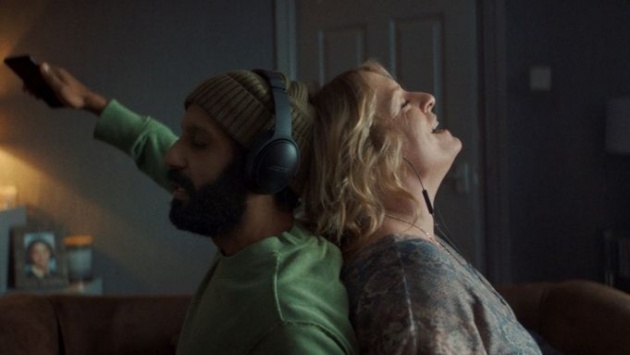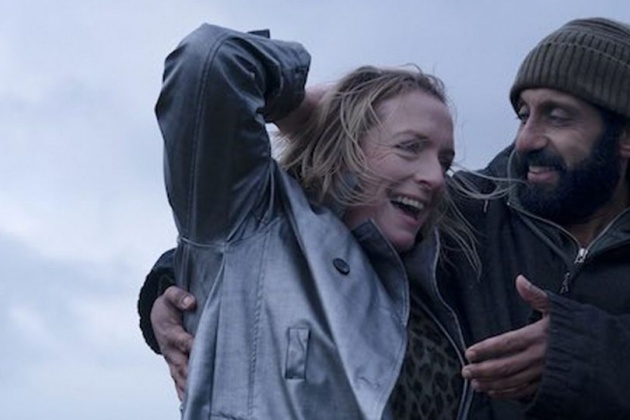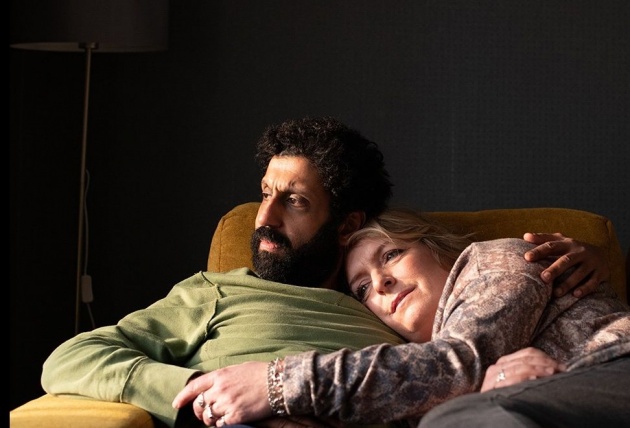
Pictured: 'I play you mine and you play me yours.' Ali (Adeel Akhtar) and Ava (Claire Rushbrook) exchange music in the Bradford-set drama, 'Ali & Ava', written and directed by Clio Barnard. Still courtesy of Altitude Films (UK)
I wasn’t really aware of the actor Adeel Akhtar until I saw him in British writer-director Clio Barnard’s Bradford-set film, Ali & Ava, in which his charismatic title character describes himself as ‘everyone’s favourite landlord’. Ali takes one of his tenant’s children, six-year-old Sofia (Ariana Bodorova) to school, where he meets Ava (Claire Rushbrook), a teaching assistant and grandmother to five children. Collecting Sofia from school, Ali boldly commits to giving Ava a ride home to the somewhat racist neighbourhood of Holme Wood. When his car is stuck at traffic lights, some local kids – young children, primary school age - throw stones. Ali gets out of the car and engages them, playing music loudly and inviting them to dance on his car boot, while Ava watches, expecting the worse. Finally, he drives them all home, piled as they are in the back seat. It is a credit to Akhtar and Barnard that the scene is utterly convincing. Ali comes across as simultaneously brave, optimistic and willing, as the saying goes, to put himself out there. At time of writing, Russia has invaded Ukraine; Akhtar’s Ali reminds me a little of the ever-optimistic-in-the-face-of-danger President Volodymyr Zelenskyy, up against impossible odds. Akhtar himself is fairly terrific.
Barnard specialises in naturalism. Ali & Ava, her fourth film takes as its point of departure, Rainer Werner Fassbinder’s 1974 film, Fear Eats the Soul, which focussed on the relationship between a white, widowed cleaner and a Moroccan man twenty years her junior whom she meets at a bar. The highly prolific Fassbinder (1945-1982), who released 22 feature-length films for the cinema as well as numerous shorts, documentaries and television series, before his death aged 37, for the most part didn’t do naturalism. His minimalist, deadpan aesthetic is closer to the films of Finnish director Aki Kaurismaki and also to the cinema of cruelty of Lars Von Trier. It is unsurprising that few female directors have taken up the bleak cinema of cruelty, practised, in the main but not exclusively, by male, homosexual directors (Fassbinder, Gregg Araki and Todd Solondz spring to mind) suggesting a link between a tortured aesthetic and an inability to be accepted in society.
By contrast, Barnard specialises in compassion, extended towards the working poor. Her film is also stylised. Although contemporary, mobile phones barely feature in it, used only as music players. We also see a horse and cart trot down the street. The film exists in a conflated reality that references the present – Eastern European tenants – and the 1980s, specifically the National Front. For the most part, the stylization is unobtrusive. When you see Ali and Ava board an old-fashioned train, with doors on hinges, rather than electric, you wonder if the film is really set in the past. I struggled to find vehicle tax discs as signifiers.
Opening up to Ava – their first conversation is about musical preferences – Ali explains that he was once a DJ, and later shows her his vinyl. Ava enjoys country music (‘Get out of the car now,’ responds Ali with deadpan cheeriness) as well as folk (this draws an expletive). Dropping Ava outside her front door, Ali is greeted with suspicion by Callum (Shaun Thomas), Ava’s only son. He has recently become a father but can’t agree a name for his baby daughter. ‘How about Paula?’ suggests Ava. Paul was Callum’s father’s name. ‘I never thought of that,’ he replies. Callum later draws a sword on Ali, who responds with a gasp. ‘Who do you think you are, Zorro?’ The sword belonged to Callum’s father. Ali leaves sharpish. However, Ava is keen to see him again. She asks Sofia to pass on a one-word note of apology: ‘Zorry.’
Ali’s cheeky humour masks heartbreak. He is separated from his wife, Runa (Ellora Torchia), after she suffered a miscarriage. The pair still occupy the same house but sleep in separate beds. Runa, who is devoting herself to her studies, is sceptical about the arrangement. Ali still wants Runa to join his family for dinner, to pretend as if nothing has changed. At the same time he reflects on the wooden rocking chair that he built for her. Seeing it outside the house, on the verge of throwing it out, Ali takes it down to his room and covers it with a dust cloth. Out at the library, he sees another man, a student, with his arm around Runa. ‘You’ve got to be careful,’ he tells her, having pulled her to one side. ‘There are eyes everywhere.’

Pictured: Fearing storm Callum, Ava (Claire Rushbrook) and Ali (Adeel Akhtar) in the Bradford-set film, 'Ali & Ava', written and directed by Clio Barnard. Still courtesy of Altitude Films (UK)
Ali’s big romantic gesture, before he is surprised by Callum, is to bring Ava some books. ‘No one ever brought me books before,’ she explains. He is surprised by her living room, two sofas in the centre of the room, facing each other: a sofa boat. Ava’s ex-husband died a year ago. The couple had split up before then. She explains to Ali that Paul beat her regularly, and that he also attacked their eldest daughter, Michelle. ‘One night he came home, and I knew he was going to start [on Michelle]. So I brought him his boots,’ Ava explains, adding that Paul hit her instead. This was the trigger to leave him. Ali notices Ava’s dissertation on criminology that just happens to be lying about. ‘I finished with Paul and started studying,’ Ava adds. Ali is impressed, mostly by her bravery.
Barnard takes one aspect from Fassbinder’s film. Ava isn’t glamorous, not by a stretch. She is overweight, though not chubby. She looks as though she had not lost the weight she put on during pregnancy. It is natural. She likes a drink and sings in her local pub. She has Irish roots and belts out ‘Dirty Old Town’ in a duet with Callum; he’s timid, she isn’t. She’s great with Sofia, giving her a laminated sheet for her day and coaxing her to climb backwards down from the metal climbing arch.
Barnard hasn’t constructed a film of big melodramatic incident. It simmers, with the threat of Callum’s anger – the young man idolises his late father – just around the corner.
Ali and Ava both have their reasons to visit the cemetery. Ali looks up at the stars. When he wants to let off some steam, he puts on his headphones and dances on top of his car. The film opens with this image.
When Ali and Ava drop in on Ava’s daughter, Dawn (Natalie Gavin) they find her vacuuming in her underwear. She has taken something. Ava coaxes her to drink water and put on some clothes. She is impressed by Ali. Later Dawn loans Ava a suitcase. They go away for a weekend. A member of Ali’s family (his sister?) even meets Ava. After their brief meeting, Ali is asked to explain what’s going on.

Pictured: Ali (Adeel Akhtar) and Ava (Claire Rushbrook) share a quiet moment in the film 'Ali & Ava', an inter-racial romance set in the North of England and written and directed by Clio Barnard. Still courtesy of Altitude Films (UK)
The film is interspersed with shots of fireworks exploding in the distance, like a never-ending 5th of November night. These represents possibilities – of beauty or magic. During their weekend away, Ava covers Ali’s eyes.
Callum is angry that his mother is forming a relationship with Ali. He moves out. ‘Did he take the sword?’ asks Ali, drily. At a party outside, by a fire, Ali sees Callum. Callum is wearing his father’s black boots.
We expect a tragedy, but Barnard doesn’t give us that. Ava has her heart broken and turns to drink – it is Dawn’s turn to fix her mother up.
There is some dry humour – Callum and his girlfriend picking out Irish girls’ names out of a beer glass (‘what’s Eimhear?’) – but Barnard steers away from sex. There is only one kiss between Ali and Ava in the movie. Her relative restraint pays dividends – the moment counts. Barnard isn’t interested in showing the characters escape their background, rather them living better within it.
The ending is optimistic. Barnard describes the film as almost a musical. Ska features on the soundtrack (The Specials’ ‘(Dawning of a) New Era’) while, against his better judgment, Ali finds himself picking up a ukulele and performing a Bob Dylan song. (‘I didn’t know you liked him,’ he is told.) Cultural boundaries are crossed. The chorus from Sylvan Esso’s ‘Slave to the Radio’ is played more than once – it’s Ali’s tune. The film is gently radical.
Barnard shot her film in late 2019. It is pre-Covid. She is served well by her cinematographer Ole Bratt Birkeland, with whom she worked on her debut, The Arbor and editor Maya Maffioli. Some of the costume details pay dividends too, from Ava’s silver bracelets to Ali’s changing headgear, variously a baseball cap and a woollen hat.
Reviewed at Cineworld Dover (Kent), Screen Six, Tuesday 22 February 2022, 19:30 screening



